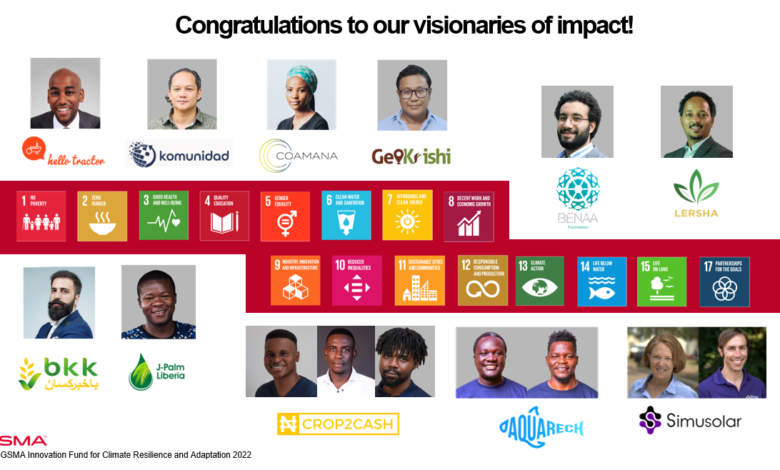GSMA Climate Resilience Fund provides funds to 8 African startups

The GSMA Innovation Fund for Climate Resilience and Adaptation, which aims to speed up the testing, adoption, and scalability of digital innovations that enable the world’s most vulnerable populations to adapt to, anticipate, and absorb the negative impacts of climate change, has announced the recipients of grants, including eight African startups.
The GSMA Innovation Fund for Climate Resilience and Adaptation, which was established a year ago, is the GSMA’s most recent project following many other targeted ones in 2018, 2019, 2020, and 2021.
The fund’s goal is to support initiatives that help low-income and vulnerable communities better prepare for, cope with, or absorb shocks or stresses related to the climate.
With 524 innovations from 70 countries seeking funding, the round was the largest for the GSMA thus far in terms of the number of applications received. In the end, 11 startups—eight of which were from Africa—were chosen to receive grant money.
Three of them are from Nigeria: Hello Tractor, CoAmana, and Crop2Cash. Hello Tractor uses weather and historical tractor service demand data to model and optimize tractor service provision. Crop2Cash offers access to agri-insurance and climate-smart farming content through a mobile app. CoAmana is a digital marketplace for farmers to access markets, buy drought-resistant seeds, and access information on best practices and financial services.
Other chosen African startups include Kenya’s Aquarech, which uses mobile technology and Internet of Things sensors to enable market access and create an inclusive aquaculture value chain; Egypt’s BENAA, which uses IoT to help turn wastewater into irrigation water; Ethiopia’s Lersha, a one-stop advisory service for smallholder farmers; Liberia’s J-Palm, which gives access to ecological information for local harvesters; and Tanzania’s Simusolar, which sustains fish populations.
Pakistan, Nepal, and the Philippines are home to other startups.
The GSMA will help these startups grow and reach their full potential throughout the grant period in order to support efforts to strengthen climate resilience. This will be accomplished by fostering partnerships with mobile operators and public sector organizations, offering technical assistance on how to reach and better serve communities most vulnerable to climate change, providing tools, templates, and specialized advisory support on how to demonstrate socioeconomic and climate impact and encourage product improvement, and providing opportunities to raise their visibility to potential investors and partners.
“In catalysing these digital solutions, we hope to generate insights from innovative use-cases, partnerships, and business models to improve the sustainability and scalability of digital climate resilience solutions,” the GSMA said.
“In doing so, the GSMA seeks to support this cohort of innovators to realize their full potential and help improve the lives of people vulnerable to climate risks.”





